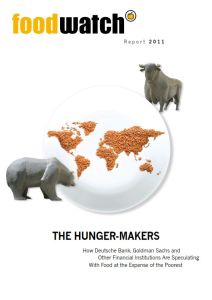Rejoignez getAbstract pour lire le résumé !

Rejoignez getAbstract pour lire le résumé !
Foodwatch
The Hunger-Makers
How Deutsche Bank, Goldman Sachs and Other Financial Institutions Are Speculating With Food at the Expense of the Poorest
Foodwatch, 2011
Aperçu
When investors speculate and drive up food prices, a billion people could go hungry.
Recommendation
Journalist Harald Schumann examines the complex relationship between investment and poverty in this report, commissioned by Foodwatch – a nonprofit organization that analyzes food industry practices. The report asserts that investments in commodity exchanges forcibly increase the price of food. With the caveat that many who are in favor of investing in agricultural commodities – and even see it as a worthwhile activity – argue persuasively in exactly the opposite direction, and that we are always politically neutral, getAbstract recommends this paper to those seeking to understand this important viewpoint about the ways that global capitalism affects food supply and poverty, how investments could benefit an investor and yet harm the poor, how these events fit together, and what you can do about them.
Summary
About the Author
Foodwatch commissioned Harald Schumann, a senior reporter for the Tagesspiegel in Berlin and an expert on international financial markets, to write this report.
























Comment on this summary